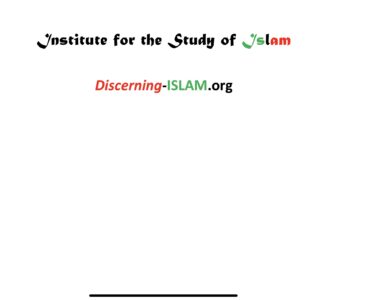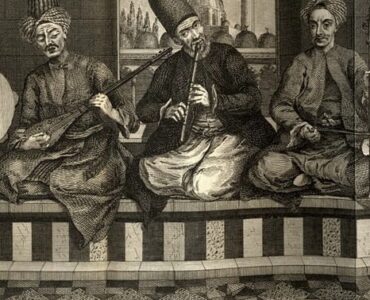
Jesus
It is not widely known that the Christian scriptures are not the only ones that discuss Jesus: the Qurʿān too contains several significant references to him. In particular, his miraculous conception and birth (19:16–33), his status as a prophet sent by Allah (5:46), and his role as a miracle-worker (3:49) are all affirmed in the Qurʿān. Two positive designations, “his [i.e., Allah ’s] word” and “a spirit from him [i.e., Allah],” are used of Jesus in the Qurʿān (4:171) and of no other figure in the Muslim scripture.
Yet the Qurʿān also challenges, or indeed appears to deny outright, s ome traditional Christian beliefs about Jesus, including his status as Son of Allah (19:34), his role as a Person of the Trinity (4:171), and his death and resurrection (4:157–158). On this basis, the teaching of the Qurʿān about Jesus is mixed: on the one hand, affirmation — Muslims will never manifest disrespect for Jesus, always, for example, using the phrase “Peace be upon him” (the acronym, PBUH, is often seenl) after mentioning his name — and on the other hand, strong rejection of important Christian convictions about Jesus, on the basis of which a long tradition of anti-Christian polemic against the ideas of Incarnation, Trinity, and Redemption has developed.
In the modern period the range of Muslim opinion about Jesus can be effectively illustrated by contrasting two books which have appeared in the past fifty years, each of which is in some sense a biography of Jesus, ʿAbbās Maḥmūd al-ʿAqqād ’s The Genius of Christ (translated and edited by J. Peter Ford, Jr., Binghamton, N.Y., 2001) and Muḥammad Raḥīm ’s Jesus, Prophet of Islam (rev. ed., Elmhurst, N.Y., 2003).
The Egyptian al-ʿAqqād ’s book, first published in 1953, was one of a series of volumes on the genius of diverse historical figures, including Abraham and Muḥammad. In considering Jesus, al-ʿAqqād was careful to make use of Christian sources, especially the New Testament, and other sources which shed light on the life and times of Jesus, especially some of the Dead Sea Scrolls, information about which was incorporated into the second edition of the book (1958). Al-ʿAqqād thus lays out carefully the context within which Jesus ’ message unfolded, with respect to both its Jewish and its Greco-Roman backgrounds, and it is clear that he had a warm appreciation for several of its themes, particularly what he calls “the law of love” and the emphasis on “the kingdom of heaven.” More traditional Islamic teaching seems to reassert itself when al-ʿAqqād comes to investigate the events at the end of Jesus ’s life, where in discussing the crucifixion he writes “here we leave the realm of history and enter the realm of faith,” but even this could be seen as recognition of the simple fact of difference between Christian and Muslim interpretations, rather than a clear rejection of the former.
The Pakistani writer Raḥīm ’s work, by contrast, displays much less sympathy for Christian perspectives on Jesus, with the preface to the first edition, written by Shaykh ʿAbd al-Qādir al-Ṣūfī, a convert to Islam. The book begins with the simple assertion that “to the Muslims, Christianity is a historical reality based on a metaphysical fiction.” While the book never demonstrates disrespect for Jesus, it is perhaps significant that the chapters on Jesus in the Qurʿān and in the hadīth and the Muslim traditions come at the end of the book. The previous eight chapters outline the author ’s main thesis, which is the historical corruption of Jesus ’s original message by various human agents, beginning with Paul. The true bearers of Jesus ’s message, according to the author, are the Unitarians, whose antecedents are traced in great detail. A major source for the book is the work of the seventeenth-century English Unitarian John Toland, though much use is also mad!1 of more recently discovered sources such as the Gospel of Barnabas, which is popular in some Muslim circles but is subject’ to scholarly debate. This book thus takes a much more polemical Muslim view of Jesus.
Jesus remains a figure of considerable debate among Muslims, as well as between Christians and Muslims and, of course, among Christians. Public debates, such as those involving the South African Muslim Ahmad Deedat (1918–2005) which are circulated on video and DVD and in pamphlets, and some material which is now available on the Internet, demonstrate the continuing interest in Jesus among Muslims but do not always shed much light on the discussion.
What Do Muslims Think About Jesus?
The Second Coming Of Jesus
As the doctrine of the Mahdī developed, disagreements occurred over his precise relationship to Jesus. Some Muslim thinkers denied that there will be a Muslim Mahdī, claiming instead that this role will be fulfilled by the second coming of Jesus. Post-Qurʿānic legends, which still persist, had also grown up about the second coming of Christ. Some say that Jesus will return as a just judge. One prophecy says that he will descend in Palestine, where he will kill al-Dajjāl (the Deceiver or Devil – see Part III); he will then worship at Jerusalem, where he will kill both swine and those who disbelieve in him. He will die after a peaceful reign of some forty years and be buried in a spot beside the tomb of Muḥammad in Medina that has been reserved for him.
Modern Significance
Islamic eschatological ideas have exerted an important influence on the development of the modern Middle East. There are several significant examples of the impact of eschatological/‘ thought on modern religious, social, and political developments. The origin of the Bābī and Bahā’ī movements in early nineteenth‐century Iran was closely tied with Iranian Shī῾ī eschatological ideas. Mirzā Ghulām Aḥmad (1835–1908), founder of the Aḥmadīyah movement in Pakistan, claimed to be the Mahdi, drawing ideas not only from Islamic eschatological thought but also from Hinduism and Christianity. Islamic eschatology was fundamental in the founding of the Mahdist state in the Sudan by Muḥammad Aḥmad ibn ῾Abd Allāh (1843–1885), which still influences the Sudan today (an excellent movie, Khartoum, stars Charlton Heston as the English, Major General Charles “Chinese” Gordon and jLaurence Olivier as Mohammad Ahmed el Mahdi). On the other hand, many modernist Muslims, influenced by secular western thought, have tended to allegorize traditional eschatological beliefs.
The ideologies of many twentieth‐century Islamic fundamentalist movements frequently include a healthy dose of eschatology. The capture of the Grand Mosque at Mecca in 1979 was based in part on Mahdist ideological claims; the ideology of the Iranian revolution was also linked to Shī῾ī eschatological thought. The significance of martyrdom among both Shī῾īs and Sunnīs — as manifest in both battle and terrorism — is linked to the Qur’ānic concept that death in the path of God guarantees entry into paradise. There is every indication that eschatological ideas will continue to play an important role in the Islamic world into the twenty‐first century.
Both Human And Devine
Jesus Is Human
In Islam, Jesus was a flesh-and-blood human being who walked the earth during a specific period of history for about thirty-three years.
There is more documentary evidence for the life of Jesus than Plato, Socrates, and many other ancient figures combined. But Christian theology is quick to point out that Jesus was unlike any other person who ever walked the earth. Why?
He Performed Miracles: Jesus did some amazing things that required supernatural power including healing the sick, walking on water, giving sight to those born blind, and raising the dead back to life. The miracles he did confirmed that he was different than any other mere teacher or prophet. After his death by crucifixion, he pulled off the biggest miracle of all by rising from the dead after three days in the grave.
He Taught Radical Ideas: Contrary to popular opinion, Jesus did not teach the same basic ideas as other spiritual gurus and prophets. In fact, many of the things he taught about God, faith and life were so offensive to the religious establishment of his day that they demanded his death. His followers continued these same teachings, causing many of them to be persecuted and killed by government and religious officials right up to our day.
He Was Perfect: Jesus lived a sinless life, something no one else has ever done. That means he could represent and replace all other human beings when he willingly endured the penalty of human sin on the cross.
Jesus Is Devine
The claim that has upset so many is that Jesus is both man and God.
Every other world religion claims to have a sacred book giving inspiration, guidance, rules, or instructions from God. But the Christian sacred book (the Bible) makes a far more radical claim in the Gospel of John. “And the Word became flesh and dwelt among us.” In other words, Jesus is God “incarnate” which means “made flesh.”
How can someone be both man and God at the same time? This is the great mystery of the Christian faith. A mystery is not a puzzle to be solved but is something that has been revealed to us even though we can’t fully grasp or explain it. But we accept it for several important reasons.
Jesus Claimed It: In John 8:58, Jesus said “Very truly I tell you, before Abraham was born, I am.” Those who heard Him took up stones to kill Him because they knew that He was claiming to be the same God called “I Am” who appeared to Moses in the burning bush thousands of years before. He made many such claims during His earthly ministry.
The Disciples Taught It: Jesus’ closest disciples became leaders of the early Christian church, and most of them were martyred (killed) for affirming that Jesus was God and that He proved His deity by rising from the dead. Despite the threat of death, all of them proclaimed Jesus to be, in the words of the skeptical Thomas, “My Lord and my God!” (John 20:28).
Early Christians Defended It: In every generation, church leaders have defended the claim that Jesus is both God and Man despite brutal attacks and intense persecution. To this day, Christian churches continue to repeat a short creed (summary of orthodox Christian belief) handed down through the generations. It states, “We believe in one Lord Jesus Christ, the Son of God . . . true God from true God, begotten not created of the same essence as the Father, through whom all things came into being, both in heaven and in earth.”
Who Is Jesus For Muslims?
“According to Islam, Jesus always speaks the truth. The question is how we understand it.”
To know more about the Jesus of Islam, we have to examine the role of Jesus in the Qur’an and in Islamic theology. He has been written about by many Islamic theologians, mystics, and scholars, including the 13th-century poet and Sufi mystic Rumi and the early 20th-century Turkish Muslim scholar Bediüzzaman Said Nursî.
Who Is Jesus In Islam?
In Islam, Jesus is one of the five greatest messengers of Allah who are collectively known as the ‘Ul al-Azm or the Possessors of Steadfastness. Jesus is also a real person who lived in Roman Judea in the first century of the Common Era. Muslims share with Christians most of the basic outlines of Jesus’ story, though there are certainly differences. In Islam, as well as in Christianity, Jesus was born to the Virgin Mary and was without a father. But for Muslims, Jesus is neither God nor the Son of God.
Like all messengers of Allah in Islam, Jesus came to his people with a message. Jesus’ message is called the Injil, or the gospel. As in the Christian tradition, He is a miracle worker and a healer. He gave sight to the blind and brought the dead back to life. The Qur’an has additional miracles ascribed to Jesus. For example, Jesus speaks from his cradle and makes a bird out of clay and breathes into it to turn it into a real bird.
What is the significance of these additional miracles? Each of these miracles occurred for a specific purpose. Take the example of Jesus speaking from his cradle. After he was born, Mary took the baby Jesus to her people, but they accused her of adultery. They said, “Mary, you have committed a terrible thing.” Without speaking, Mary pointed to the baby as if to say, “Do not ask me, ask the baby.” The people asked how they could speak to a baby; Jesus then started speaking.
According to the Qur’an, Jesus said, “I am indeed the servant of God. He has given me the Book and made me a prophet. He made me blessed wherever I am and advised me of prayer and charity as long as I live. He made me kind to my mother and never made me arrogant or disobedient.
Beyond believing Jesus is one of the five elite messengers of Allah, Muslims believe that Jesus will return to bring justice to the world. Muslim theologians call this “the descent of Jesus” to earth. This eschatological return of Jesus is unique among the prophets of Allah.
How doesm Jesus’ return figure into Islamic eschatology? Some say that Jesus will literally and physically descend from the sky and lead a great battle against ad-Dajjal or the Antichrist. Others understand this allegorically, which is more in keeping with the spirit of the Qur’an and the words of the Prophet of Islam. Some of the most interesting and productive interpretations relate Jesus’ coming down to the strengthening of spirituality, which is seen as a sign of alliance between Christians, Muslims, and Jews. But there is a lot of complexity in this area of Islamic theology.
In Islam, the birth of Jesus is considered miraculous and the only such example in human history. Some Qur’anic verses tell us that Allah revealed his message to Mary but told her that when her people asked her about her baby she would remain silent. Because of this divine revelation, some Muslim theologians consider Mary a prophet of God, aslo. The Prophet of Islam describes her as the highest woman in paradise, literally the master of the women of paradise.
What Is The meaning Of Messiah In Islam?
Interestingly, out of all prophets and messengers of God, Jesus is the only messenger who received the title of al-Masih, or Messiah, in the Qur’an. The term can be translated as the Anointed One. The root of the word has something to do with touching: mash means to touch. This is related to Jesus’ touching when he would heal people afflicted with various diseases. Al-Masih also refers to the eschatological purpose of Jesus, his coming at the end of time. But much of the discussion of Jesus’ eschatological purpose is found in the Hadith literature and not in the Qur’an itself.
Jesus
621 -009
Last Update: 06/2021
Copyright © 2017-2021 Institute for the Study of Islam (ISI) | Institute-for-the-study-of-Islam-org | Discerning Islam | Discerning-Islam.org | Commentaries on Islam | © 2020 Tips Of The Iceberg | © 1978 marketplace-values.org | Values In The Marketplace | are considered “Trade Marks and Trade Names” ®️ by the Colorado Secretary of State. All Rights Reserved.



